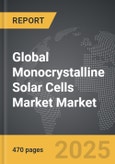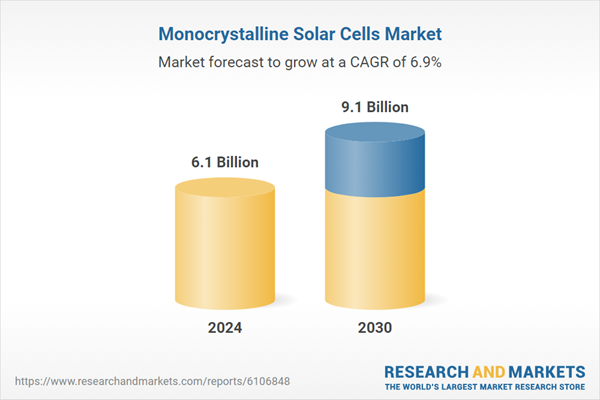Global Monocrystalline Solar Cells Market- Key Trends & Drivers Summarized
Why Are Monocrystalline Solar Cells Gaining Preference Over Other Technologies?
Monocrystalline solar cells are becoming the leading choice in the photovoltaic market due to their high efficiency, compact size, and long-term reliability. These cells are made from a single-crystal silicon structure, which allows electrons to move more freely, resulting in better energy conversion rates compared to polycrystalline and thin-film alternatives. This efficiency advantage makes them especially suitable for space-constrained installations, including residential rooftops, commercial buildings, and mobile solar units.Durability and low degradation rates add to their appeal, contributing to a lower cost per watt over time. These factors make monocrystalline cells a strong choice for users looking to maximize output and investment in solar energy systems. As demand for clean electricity increases, both consumers and project developers are selecting monocrystalline panels for their ability to deliver more power using fewer modules.
How Are Technological Innovations Enhancing Cell Performance and Usability?
Advancements in manufacturing and cell design are significantly improving the performance of monocrystalline solar cells. Passivated Emitter and Rear Cell, or PERC, technology has become standard, enhancing light capture and reducing recombination losses. Newer technologies such as TopCon, heterojunction, and interdigitated back contact are being introduced to push efficiency levels further and reduce production costs.Other enhancements include thinner wafers, improved anti-reflective coatings, and bifacial module designs that capture reflected sunlight from the rear side. Half-cut cells are also being adopted to reduce resistance and increase shade tolerance. These developments are enabling monocrystalline cells to operate effectively in a wide range of environmental conditions, including low light, partial shading, and high temperatures, making them more suitable for global deployment.
Where Is Demand Accelerating and Who Are the Main Users?
Global demand for monocrystalline solar cells is increasing across residential, commercial, and utility-scale projects. Countries with strong solar initiatives such as China, India, the United States, Germany, and Japan are witnessing rapid adoption due to favorable policies, rising electricity costs, and decarbonization goals. Urban areas, where space is limited and aesthetics are important, particularly favor monocrystalline panels for their sleek appearance and high power density.Primary users include homeowners, solar developers, EPC contractors, and government-backed renewable energy programs. Off-grid applications such as rural electrification, mobile charging units, and backup systems are also using monocrystalline modules because of their superior performance in compact installations. The commercial and industrial segments continue to invest in rooftop solar systems using monocrystalline panels to lower energy costs and meet sustainability targets.
What Factors Are Driving Growth in the Monocrystalline Solar Cells Market?
Growth in the monocrystalline solar cells market is driven by several factors including the global shift toward renewable energy, rising demand for efficient and space-saving solar technologies, and continued reductions in production costs. Energy transition policies, carbon reduction commitments, and improved financing options are supporting expansion in both developed and emerging markets.Advances in cell architecture, increased automation in manufacturing, and material optimization are lowering prices while maintaining high quality and performance. Market preference is also influenced by visual design, with monocrystalline panels offering a uniform black finish that appeals to residential buyers. As utility-scale projects seek higher energy yields per square meter and governments tighten regulations on clean energy targets, monocrystalline solar technology is set to remain central in the evolving energy landscape.
Report Scope
The report analyzes the Monocrystalline Solar Cells market, presented in terms of market value (US$). The analysis covers the key segments and geographic regions outlined below:- Segments: Grid Type (Grid Connected Type, Off-Grid Type); Installation (Ground-Mount Installation, Rooftop Solar PV Installation); Technology (Crystalline Silicon Cells Technology, Thin Film Cells Technology, Ultra-Thin Film Cells Technology); Application (Residential Application, Commercial Application, Industrial Application, Power Utilities Application).
- Geographic Regions/Countries: World; United States; Canada; Japan; China; Europe (France; Germany; Italy; United Kingdom; Spain; Russia; and Rest of Europe); Asia-Pacific (Australia; India; South Korea; and Rest of Asia-Pacific); Latin America (Argentina; Brazil; Mexico; and Rest of Latin America); Middle East (Iran; Israel; Saudi Arabia; United Arab Emirates; and Rest of Middle East); and Africa.
Key Insights:
- Market Growth: Understand the significant growth trajectory of the Grid Connected Type segment, which is expected to reach US$5.4 Billion by 2030 with a CAGR of a 5.5%. The Off-Grid Type segment is also set to grow at 9.2% CAGR over the analysis period.
- Regional Analysis: Gain insights into the U.S. market, valued at $1.7 Billion in 2024, and China, forecasted to grow at an impressive 10.5% CAGR to reach $1.9 Billion by 2030. Discover growth trends in other key regions, including Japan, Canada, Germany, and the Asia-Pacific.
Why You Should Buy This Report:
- Detailed Market Analysis: Access a thorough analysis of the Global Monocrystalline Solar Cells Market, covering all major geographic regions and market segments.
- Competitive Insights: Get an overview of the competitive landscape, including the market presence of major players across different geographies.
- Future Trends and Drivers: Understand the key trends and drivers shaping the future of the Global Monocrystalline Solar Cells Market.
- Actionable Insights: Benefit from actionable insights that can help you identify new revenue opportunities and make strategic business decisions.
Key Questions Answered:
- How is the Global Monocrystalline Solar Cells Market expected to evolve by 2030?
- What are the main drivers and restraints affecting the market?
- Which market segments will grow the most over the forecast period?
- How will market shares for different regions and segments change by 2030?
- Who are the leading players in the market, and what are their prospects?
Report Features:
- Comprehensive Market Data: Independent analysis of annual sales and market forecasts in US$ Million from 2024 to 2030.
- In-Depth Regional Analysis: Detailed insights into key markets, including the U.S., China, Japan, Canada, Europe, Asia-Pacific, Latin America, Middle East, and Africa.
- Company Profiles: Coverage of players such as ACE Money Transfer, Azimo, Cash App (Square), Flutterwave Send, Google Pay and more.
- Complimentary Updates: Receive free report updates for one year to keep you informed of the latest market developments.
Some of the 44 companies featured in this Monocrystalline Solar Cells market report include:
- Aiko Solar (Shanghai Aiko Solar Energy)
- AE Solar
- Astronergy (Chint Group)
- Canadian Solar Inc.
- First Solar, Inc.
- GCL System Integration
- Hanwha Q CELLS
- JA Solar Holdings Co., Ltd.
- JinkoSolar Holding Co., Ltd.
- LONGi Green Energy Technology Co., Ltd.
- Maxeon Solar Technologies, Ltd.
- REC Group
- Risen Energy Co., Ltd.
- Sharp Solar (Sharp Corporation)
- SolarWorld AG
- SunPower Corporation
- Talesun Solar Technologies Co., Ltd.
- Trina Solar Limited
- Yingli Green Energy Holding Company
- Zhonghuan (Tongwei Solar)
This edition integrates the latest global trade and economic shifts into comprehensive market analysis. Key updates include:
- Tariff and Trade Impact: Insights into global tariff negotiations across 180+ countries, with analysis of supply chain turbulence, sourcing disruptions, and geographic realignment. Special focus on 2025 as a pivotal year for trade tensions, including updated perspectives on the Trump-era tariffs.
- Adjusted Forecasts and Analytics: Revised global and regional market forecasts through 2030, incorporating tariff effects, economic uncertainty, and structural changes in globalization. Includes historical analysis from 2015 to 2023.
- Strategic Market Dynamics: Evaluation of revised market prospects, regional outlooks, and key economic indicators such as population and urbanization trends.
- Innovation & Technology Trends: Latest developments in product and process innovation, emerging technologies, and key industry drivers shaping the competitive landscape.
- Competitive Intelligence: Updated global market share estimates for 2025, competitive positioning of major players (Strong/Active/Niche/Trivial), and refined focus on leading global brands and core players.
- Expert Insight & Commentary: Strategic analysis from economists, trade experts, and domain specialists to contextualize market shifts and identify emerging opportunities.
Table of Contents
Companies Mentioned (Partial List)
A selection of companies mentioned in this report includes, but is not limited to:
- Aiko Solar (Shanghai Aiko Solar Energy)
- AE Solar
- Astronergy (Chint Group)
- Canadian Solar Inc.
- First Solar, Inc.
- GCL System Integration
- Hanwha Q CELLS
- JA Solar Holdings Co., Ltd.
- JinkoSolar Holding Co., Ltd.
- LONGi Green Energy Technology Co., Ltd.
- Maxeon Solar Technologies, Ltd.
- REC Group
- Risen Energy Co., Ltd.
- Sharp Solar (Sharp Corporation)
- SolarWorld AG
- SunPower Corporation
- Talesun Solar Technologies Co., Ltd.
- Trina Solar Limited
- Yingli Green Energy Holding Company
- Zhonghuan (Tongwei Solar)
Table Information
| Report Attribute | Details |
|---|---|
| No. of Pages | 470 |
| Published | February 2026 |
| Forecast Period | 2024 - 2030 |
| Estimated Market Value ( USD | $ 6.1 Billion |
| Forecasted Market Value ( USD | $ 9.1 Billion |
| Compound Annual Growth Rate | 6.9% |
| Regions Covered | Global |









